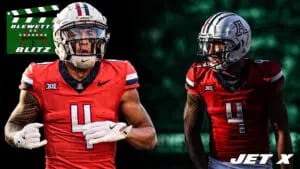The New York Jets’ biggest goal for the rest of this season should be disaster mitigation.
Yes, things are already disastrous. But it’s Joe Douglas’ and Jeff Ulbrich‘s jobs to make sure things will be the least bad heading into 2025. That means benching Tyron Smith.
The Jets’ left tackle deserves a benching in his own right. Statistically, he has been one of the worst pass-blocking tackles in the NFL. His 6.53% pressure rate ranks 52nd out of 66 qualified tackles (min. 150 pass-blocking snaps) and is nearly double his 3.36% rate from a season ago. He is tied for the second-most sacks allowed with five and has also been called for six penalties.
Theoretically, in a lost season, there is little point in benching Smith. At this point, the Jets could just let him ride it out and then let him walk (or even retire) in the offseason. However, benching Smith is urgent for two specific reasons.
For one thing, the Jets drafted Olu Fashanu with the 11th overall pick. True, in a best-case scenario, they hoped Fashanu would sit and learn for a year. However, they knew he would most likely play a significant role due to injury. Is poor performance really that different? At this point, it behooves the Jets to give Fashanu some experience. It’s not as if putting a rookie out there would put Aaron Rodgers at more physical risk considering how poorly Smith has played.
Perhaps more importantly, Smith’s playing-time incentives make his cap hit increase as he continues to rack up snaps. Smith had $6.5 million guaranteed entering the season, and the rest of his contract was tied to incentives.
Here’s how the incentives broke down, per Spotrac. There were two separate tiers of playing time incentives; if he reached the maximum of Tier 1, he could earn additional incentives in Tier 2.
Tier 1 incentives
- 38% snaps: $750,000
- 44% snaps: $1.75M
- 50% snaps: $2.75M
- 56% snaps: $3.75M
- 62% snaps: $4.75M
- 68% snaps: $5.75M
Tier 2 incentives
- 74% snaps: $1.25M
- 80% snaps: $2.5M
- 86% snaps: $3.75M
- 92% snaps: $5M
- 98% snaps: $6.25M
There was also a $500,000 Pro Bowl incentive and a $250,000 incentive per playoff win. Both of those are all but off the table, so let’s stick with the playing time incentives.
For playing 38-68% of the Jets’ snaps, Smith could earn up to $5.75 million in incentives. On top of that, if he played between 74-98% of snaps, he could earn an additional $6.25 million for a total of $12 million. So, for example, if Smith plays 86% of the Jets’ snaps, he would earn an additional $5.75 million + $3.75 million = $9.5 million.
Smith has played 100% of the Jets’ offensive snaps thus far. If the season ended today, Smith’s total salary, with incentives, would be $18.5 million. Some or all of the $12 million in incentives would count against their 2025 cap. (It is unclear whether any of those incentives counted against the 2024 cap as likely to be earned incentives; Over the Cap indicates they were trying to confirm, but there is no further clarification.)
Smith already has $3.6 million of his contract deferred to next season as a dead cap charge; that mark could be as high as $15.6 million with his playing time incentives. The last thing the Jets want is that kind of dead cap charge after a dismal season. Therefore, they should bench Smith to reduce his playing time incentive to the minimum.
The Jets have had 509 offensive snaps through 8 games, or 63.6 per game. At that rate, they will finish with 1,082 snaps for the season. If Smith does not take another snap, he will finish the season with 47% of the Jets’ snaps, which would limit him to just a $1.75 million playing-time incentive.
Therefore, the Jets must limit the damage and bench Smith now. Every game he plays increases the amount of dead cap the Jets will have in 2025. For a team that will be in rebuilding mode sooner rather than later, reducing all future cap hits must be priority No. 1.
The fortunate part is that because Smith is playing so poorly, the Jets can veil this cap manipulation attempt as a performance benching. It makes perfect sense for them to replace the veteran with the rookie. Obviously, most prognosticators with any experience or savvy will see right through it, but it is completely justifiable nonetheless.
Will Joe Douglas put his foot down? Doubtful, but necessary.








